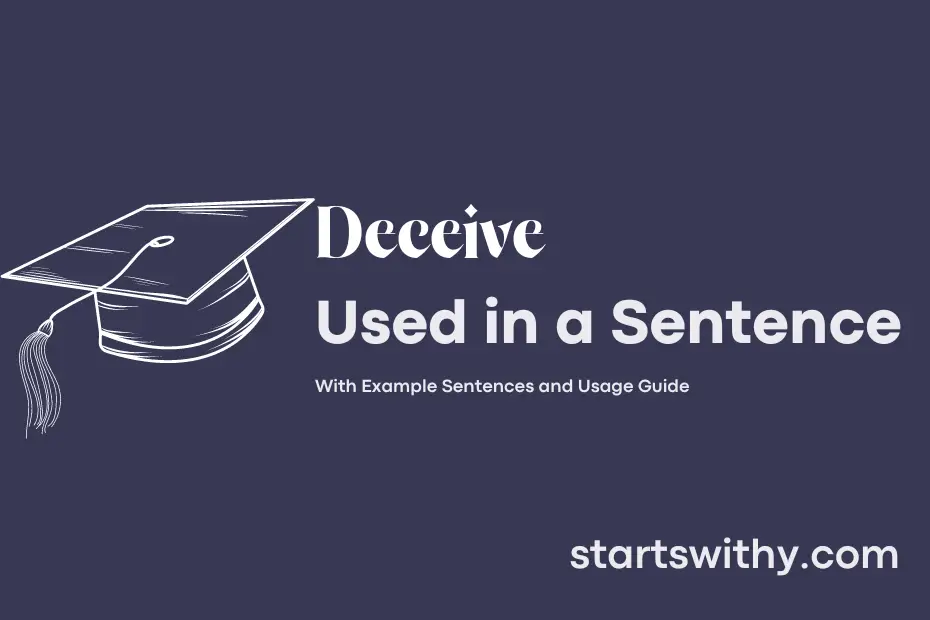Have you ever wondered how easily our perception can be manipulated through deceptive practices? Deception, simply put, is the act of misleading or causing someone to believe something that is not true.
In our daily interactions, we often encounter instances where individuals deceive others for personal gain or to avoid consequences. Whether it’s a misleading advertisement or a false promise, the art of deception can have significant impacts on our decisions and beliefs.
7 Examples Of Deceive Used In a Sentence For Kids
- The magician tried to deceive us with his magic tricks.
- Don’t let anyone deceive you with false promises.
- The fox used its cleverness to deceive the other animals.
- It is not nice to try and deceive your friends.
- Always be honest and never try to deceive others.
- Make sure to always question things that seem like they may deceive you.
- The superhero used his powers to deceive the evil villain.
14 Sentences with Deceive Examples
- It is unethical to deceive your classmates by sharing incorrect information during group study sessions.
- Plagiarism is a form of deception where students try to pass off someone else’s work as their own.
- Cheating on exams is a dishonest way to deceive your professors and jeopardize your academic integrity.
- Some students try to deceive their parents by hiding their poor grades and pretending everything is fine.
- Using fake certificates to get into a college is a form of deception that can have serious consequences.
- Fabricating data in research projects is a serious offense that can deceive both your peers and professors.
- Some students might try to deceive their professors by pretending to understand the material when they actually don’t.
- Plagiarizing from online sources is a common way that students deceive their instructors and compromise their own learning.
- Falsifying qualifications on your resume is a deceptive practice that can deceive potential employers.
- Some students may try to deceive their friends by pretending to have read a book that they haven’t actually finished.
- Lying about attending classes or completing assignments is a way that some students deceive their parents about their academic performance.
- Taking credit for group projects that you didn’t contribute to is a form of deception that undermines the hard work of your peers.
- Altering grades on your transcript is a dishonest way to deceive future academic institutions about your academic performance.
- Manipulating others into doing your work for you is a form of deception that can harm both you and those you exploit.
How To Use Deceive in Sentences?
To use “Deceive” in a sentence effectively, follow these steps:
-
Understand the meaning: Deceive means to deliberately mislead or trick someone into believing something that is not true.
-
Choose the appropriate context: Find a situation where deception is involved or where someone is trying to mislead another person.
-
Identify the subject: Determine who is deceiving whom in the sentence. This is crucial for the sentence to make sense.
-
Structure the sentence: Begin the sentence with the subject followed by the action of deceiving. For example, “She tried to deceive her friends by pretending to be someone else.”
-
Use descriptive language: Add details to make the deception clear in the sentence. For instance, “The magician’s tricks were meant to deceive the audience into thinking he had magical powers.”
-
Check for clarity: Ensure that the sentence clearly conveys the act of deception without confusion. You can ask someone to read the sentence and provide feedback.
-
Practice: Write multiple sentences using the word “deceive” in different contexts to improve your understanding and usage of the word.
By following these steps, you can effectively use “Deceive” in a sentence. Remember to always consider the context and clarity of your sentences to effectively communicate the act of deception.
Conclusion
In conclusion, sentences that deceive are crafted with the intent to mislead or manipulate the reader or listener. These sentences often involve false information, half-truths, or clever wording that may beguile individuals into believing something that is not entirely accurate. It is important to be vigilant and critically evaluate information presented in sentences to avoid being deceived or misled.
By being aware of the potential for deceit in sentences, individuals can practice skepticism and actively seek out reliable sources of information to verify claims. Developing strong critical thinking skills can help individuals discern deceptive sentences from truthful ones, ultimately empowering them to make more informed decisions and navigate the complexities of communication in today’s world.



